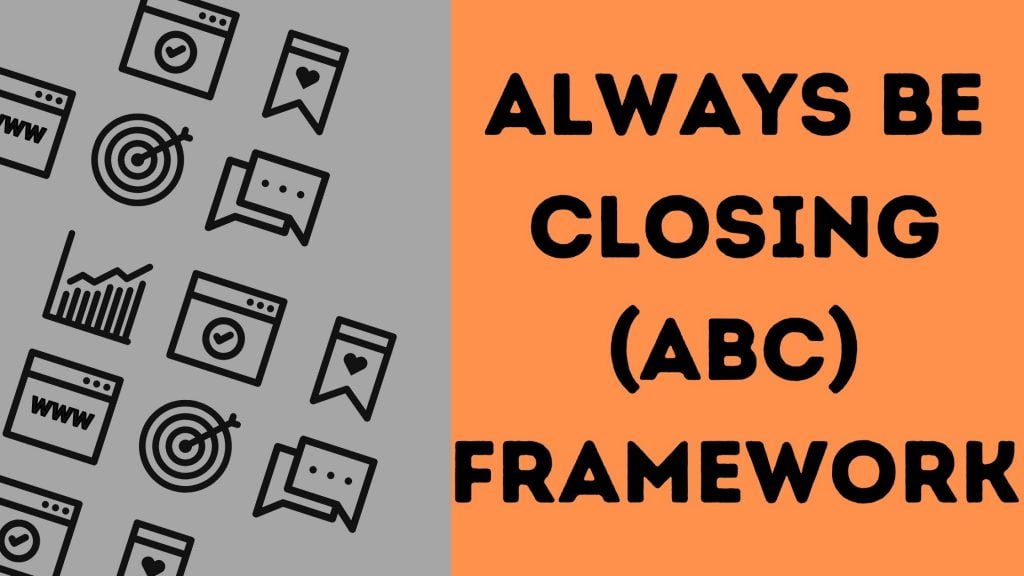
The sales job is hard – it requires consistency, persistence, and the will to keep learning on how to improve sales. For this, frameworks like ‘Always be Closing’ (ABC) act as a motivational phrase to develop a sales mindset where a salesperson focuses on engaging in a continuous cycle of gauging prospects, pitching, and closing them using whatever sales strategy is necessary.
Using the ABC framework, one is expected to develop a strong lead qualification process at every step of the sales framework that converges to closure. Thus, closing sales takes precedence, irrespective of the sales tactics used.

As a business, you can get the most out of your sales team by nurturing a sales culture that embraces the ABC framework. Here are some steps to implement ‘Always Be Closing’ in your organization:
Tweak your sales framework by looking through your closures and failures to understand the demographics and interests of your customers. Prepare different user personas and define their problem statement, existing solutions used to solve the problem, and where they spend their time. Prepare a tailored sales pitch for each persona and reach out to explain how your product is the perfect solution to their problem statement.
It’s always easy to convert a customer who is in a state of emergency for the service you offer. But sometimes, customers take a lot of time to decide as they might be looking at alternatives. As a result, during your sales call, they will devise reasons to stall the purchase.
Don’t give them a chance to do so – develop a fear of missing out (FOMO) as a part of your sales strategy with an offer and paint a picture of their state if they do not take it. Offering limited period pricing, special trial periods can create FOMO. Expedite the purchase by including competitor comparisons and be prepared to answer any FAQ.
As a salesperson, knowing when and where to showcase your perseverance should be a part of your sales strategy. If you’re dealing with a non-ideal customer, prepare a separate sales framework. This includes a separate sales pitch and flows to understand at what juncture you should stop following up with them. You’d rather spend the time discovering new leads that fit your ideal customer profile as per your business development strategy.

The ‘always be closing’ phrase was used for the first time in the film ‘Glengarry Glen Ross’ which was scripted by David Mamet in 1992. This film was an adaptation of the 1982 Pulitzer Prize-winning play of the same name.
The movie is about four real estate salesmen, where a situation of ruthless competition heats up when they learn that two low-performing teammates will be fired by the weekend. During the scene of Alec Baldwin’s ‘coffee is for closers’ speech, he mentions the phrase ‘Always Be Closing’. He flips to the blackboard to write ‘always be closing’ while repeating this phrase several times to motivate the real estate agents.

In the movie, adopting the ABC framework did motivate the employees, but it also backfired since it led to unhealthy competition and the adoption of unethical means to close sales. The ABC framework focuses on closing sales by any means – even if the customers may not truly need your product.
While doing this may increase your business revenues in the short term, this impacts your brand reputation and decreases trust among your existing customers in the long term. It also makes your sales professionals egoistic and vulnerable to controversies.
Considering we live in a well-connected world where word of mouth spreads like wildfire and Gen-Zs tend to be more ethical, it’s essential to position your business development strategy and sales framework that aligns with new-age values.
One can think of adopting the Always be Helping or Always be building a relationship framework – a new motto for the sales professionals of modern times.
Under this, you prioritize helping the customer solve their problem and build a trustworthy relationship over closing the sale. It’s implemented by modifying your sales strategy as follows:
Under the ABC framework, you are expected to adapt your sales pitch to suit the customer’s problem statement. But your product may prove to be a disastrous solution to the customer, leading to huge support tickets and chaos. Hence, give an ear and listen to the problem stated by your prospect and determine if your product is the right fit. If it’s not the case, you will help save their time and yours.
You can use tactics like asking for references in their network who might need the product offered by you or offer to keep in touch for future requirements. Keep in mind that if you try to help everyone, you end up helping no one.
It’s important to educate your customers about your industry, what you offer, and how your product works. A standard way to do this is by preparing use case website pages, help pages, competitor comparison pages, writing SEO optimized content like Guides, eBooks, templates, etc. This helps you warm up the prospect to your offering so that they can grasp your sales pitch.
A successful sales professional understands the importance of human emotions and the need to build relations. They ensure they build a rapport with the prospect where both the parties come in agreement in terms of the expectations and deliverables. Thus, the sales strategy adopted here is to be transparent, build trust to have a long-term engagement whether they purchase from you or not.
You can choose the ABC framework or the modern-day strategies mentioned as per your organization’s values and priorities.